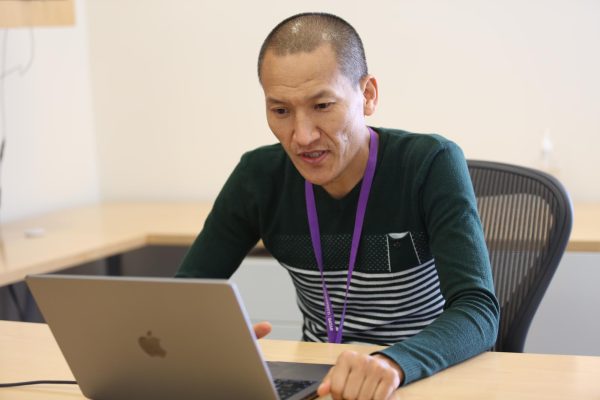Raising a child with autism
“Majnoon. Lunatic.” Those were the words people used to describe Zainab Urfan, 17, who has high-functioning autism.
“People make these silly comments about her,” said Urfan’s mother, Nousheen Ashraf. “They will be very sorrowful and very pitiful. ‘Oh! We are miskeen [destitute] people in the world’ and you just have to listen to it.” People continue to ask Ashraf invasive questions about Urfan’s personal life, like her menstrual periods. “Before I used to give sarcastic answers,” she said. “But now, I just stay quiet.”
Autism Spectrum Disorder is a developmental pediatric disorder that affects children’s language, communication, and social interaction skills, according to Dr. Fatima Janjua, division chief of developmental pediatrics at Sidra Medicine. “They cannot pick up social cues like children without autism,” she said.
During our conversation with her mother, Urfan hummed the melody of a song from a recent Bollywood movie. “I like Bollywood music, not the movies,” she said. “And Hum TV.”
Contrary to what many people believe about autistic children, Urfan is quite independent and lively. As we walked through the door, she greeted us with a blinding smile and offered us water as we sat down. “Zaini [Ashraf] likes talking to girls her age,” her mother said.
As we spoke to her mother, we realized the Urfan was keenly listening to the conversation, nodding her head and chiming in whenever her mother missed something.
What is Autism Day? You have to tell people she is here, she likes people, but she just cannot involve herself with them. They need to understand, or what’s the point?
April 2 is World Autism Awareness Day, when communities engage in learning and raising awareness about autism and people living with autism. The day, which was proposed by Sheikha Mozah Bint Nasser Al-Missned to the United Nations, was adopted without a vote. “Getting the community involved always helps,” said Janjua. “Awareness about autism is key. If people don’t know, they can’t understand.”
Ashraf noticed a delay in Urfan’s speech skills early on, but attributed it to her epilepsy, which Urfan developed when she was nine months old. “We thought she was delayed because of the medicines,” she said. Not having met anyone with special needs and not knowing what autism was, Ashraf said she and her family waited longer than they should have, but eventually got a diagnosis in 2006 in Pakistan. “It took all of us a while to know that is altogether another area.” She recalls feeling a sense of denial and grieving the loss of a “typical future” for her daughter. “It was a big blow,” she said, “but I hated the pity.”
Children usually learn social and behavioral skills instinctively as they grow up. However, children with autism cannot do that. “They often behave in ways that are inappropriate,” said Janjua. Most times, they indulge in parallel activities.
“She [Urfan] wants to meet new people, but she will stay with us [Ashraf], she will not mingle. She does not know how to interact,” said Ashraf. Reading other people’s emotions is also difficult for those with autism.
Routines play a significant role in the lives of children with autism, according to Janjua. Children usually feel overwhelmed by the commotion of every day life. Having a set daily routine helps create stability. If there is a change in the routine, it can adversely affect the mood of the child. “Zain [Urfan] likes drawing the curtain at maghrib [dusk], but if someone else does it, she’ll get really upset. Sometimes, she won’t be able to sleep properly at night,” said Ashraf.
A key factor of being able to treat with children with autism is enabling them to attend school, according to Janjua. During her first few years in Pakistan, Urfan was in a convent school that allowed interaction between students with and without special needs. Because Urfan had high functioning autism and was doing very well in her education, she was going to be admitted to a mainstream school system.
Moving to Qatar from Pakistan in 2010, however, was the start of a difficult struggle. Ashraf tried to get Urfan enrolled in schools with special needs education. But none of those schools worked out because of the high school fees, ranging anywhere from QAR 3,000 a month to QAR 10,000 a month. Ashraf also noticed major differences in Urfan’s prior education and the education she was currently receiving.
As a final attempt, Ashraf tried to enroll Urfan in a Pakistani school. “I begged the principal. “I know if I work in the school, I can put her [Urfan] in,” she said, referring to school rules which allow employees’ children to attend schooling for free. “They [the school] said no and I asked them, ‘Can you understand the fact that I cannot pay?'”
“I can’t forget those moments. Your own child is suffering and you don’t know what to do. She cannot go to school because I cannot afford it.
As she recalled her struggles, tears welled up in Ashraf’s eyes. “I can’t forget those moments. Your own child is suffering and you don’t know what to do. She cannot go to school because I cannot afford it. She [the principal of the school] just rejected her without even seeing her. If she was taken, I’m sure she would be much better,” she said.
After her last attempt at education for her daughter, Ashraf was forced to have Urfan stay home for a year and a half. Then the Pakistan Special Needs Community, a subsidiary of the Pakistan Welfare Forum Qatar, began a small program in 2015 for children with special needs who are not in school. Within a few months, Ashraf enrolled Urfan in it. The school costs Ashraf QAR 1,000 per month. Despite the small setup, Ashraf is happy to see Urfan progressing. “This is the only place. Not the best place, but the only place,” she said.
Ashraf thought she’d never see Urfan graduate from school. But she has been to four of Urfan’s yearly graduation events. This helped her move on from grieving over her daughter’s disorder to acceptance of it. “Your child is beautiful how she is,” she reflected.
When Urfan was 14 years old, Ashraf got pregnant with her second child, Musa. Because of the diversion of her mother’s attention, Urfan began to slide into depression. She started gaining weight and even till now resents her brother to some degree. But Ashraf attributes that to simple sibling rivalry. “There is no direct affection between them. She’ll pick out his night clothes to bed, but I want it to be direct,” she said.
Ashraf remembers falling prey to a dilemma: whose education is more important, Urfan or Musa’s? “Musa can grow up and take care of me but she [Urfan] is going to depend on me forever,” she said. Parents of children with autism can be forced to choose between their children, according to Ashraf. “It’s a very hard decision for a parent to make,” she said. Because of the community’s reaction to children with autism, many parents decide to hide their children at home, she added.
Ashraf said it is important to her to engage in conversation with Musa about Urfan and her autism. “During story time, we tell him [Musa] that Zain [Ashraf] is not like other adults; that you have to adjust to her,” she said. Musa has been understanding, despite his young age. “Sometimes he’ll ask me to back off when he sees that she is upset.”
Despite the strides made for those with special needs, Ashraf believes local society in Doha is not yet ready to accept them. “What is Autism Day? You have to tell people she is here, she likes people, but she just cannot involve herself with them. They need to understand, or what’s the point?”
With reporting by Hazar Kilani and Malek Al Manaa.















